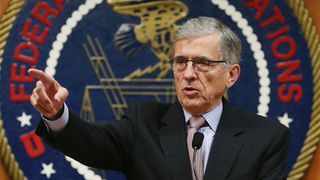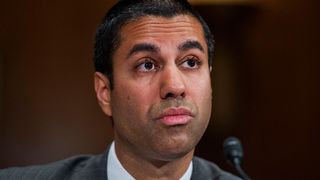Wheeler: Trump Tweet Should Not Sway FCC on Sinclair

Former FCC chair Tom Wheeler was looking to leverage President Donald Trump's pro-Sinclair tweet this week to pressure the current FCC to look seriously at Sinclair's fitness to be a licensee, not simply of the Tribune stations it wants to buy, but the ones it already owns.
The President tweeted that it was a disgrace that the FCC had not approved the merger--instead designating it for a hearing over concerns Sinclair was retaining de facto control of stations it was claiming to be spinning off to comply with FCC ownership rules.
In a commentary on the Brookings Web site, Wheeler praised the decision to designate the deal for hearing, but said he was worried about what would happen next given the President's tweet that the deal should have been approved to add a "much-needed Conservative voice for and of the People."
Trump had earlier in the year tweeted his preference for Sinclair over CNN, a familiar media target, and the "even more fake" NBC.

At an FCC oversight hearing this week, FCC chair Ajit Pai said the only thing influencing him on merger reviews was the facts, the law, and the public interest. Period.
Related: Pai Says Tribune Decision Based on Facts, Law
Wheeler said the latest tweet moved that presidential "thumb on the scale" for the deal to a "chain-mailed fist."
Broadcasting & Cable Newsletter
The smarter way to stay on top of broadcasting and cable industry. Sign up below
Wheeler said the tweet signaled Sinclair not to withdraw the deal, which often happens when mergers are referred to the FCC administrative law judge. "The Trump tweet not only makes the Commission’s job adjudicating the matter even more complicated; the President’s inappropriate, out-of-channels involvement possibly taints the whole proceeding," he said.
"The Trump FCC will ultimately decide whether the much-ballyhooed decision to send the transaction to a hearing is anything more than a smokescreen designed to focus attention on three specific license transfers while the remaining 39 stations sail through to make the largest broadcaster even bigger," he continued. "The recent Trump tweet would seem to support such approval."
Sinclair has withdrawn the three TV station transfers the FCC had the most trouble with, but there are issues of lack of candor and misrepresentation that go beyond those to the other 39 Tribune stations in the deal. Lying to the FCC can be a license-losing offense, though Sinclair says it told the FCC what it was doing, and with whom, so there should have been no surprises. Similar sidecar deals and sales to parties with connections to the seller have passed muster before, so Sinclair could have assumed they would not raise red flags with the current deregulatory FCC.
Wheeler says the FCC must look beyond the deal. "Sinclair’s alleged dishonesty raises the critical issue of whether such a deceptive company is qualified to hold any licenses in public trust....The potential collapse of the merger may not be Sinclair’s—or the Trump FCC’s—biggest problem. How the FCC pursues its assertions of misrepresentation and lack of candor, especially in face of the Trump tweets, will test the agency’s integrity
as well."
Wheeler suggests that not looking at Sinclair's overall qualification for licenses, which could come at the hearing, or in an independent investigation outside the deal--particularly if Sinclair withdrew the deal and obviated the hearing--or at license renewal time, would be part of an administrative "smoke screen" meant to cover approval of the deal.
Contributing editor John Eggerton has been an editor and/or writer on media regulation, legislation and policy for over four decades, including covering the FCC, FTC, Congress, the major media trade associations, and the federal courts. In addition to Multichannel News and Broadcasting + Cable, his work has appeared in Radio World, TV Technology, TV Fax, This Week in Consumer Electronics, Variety and the Encyclopedia Britannica.

